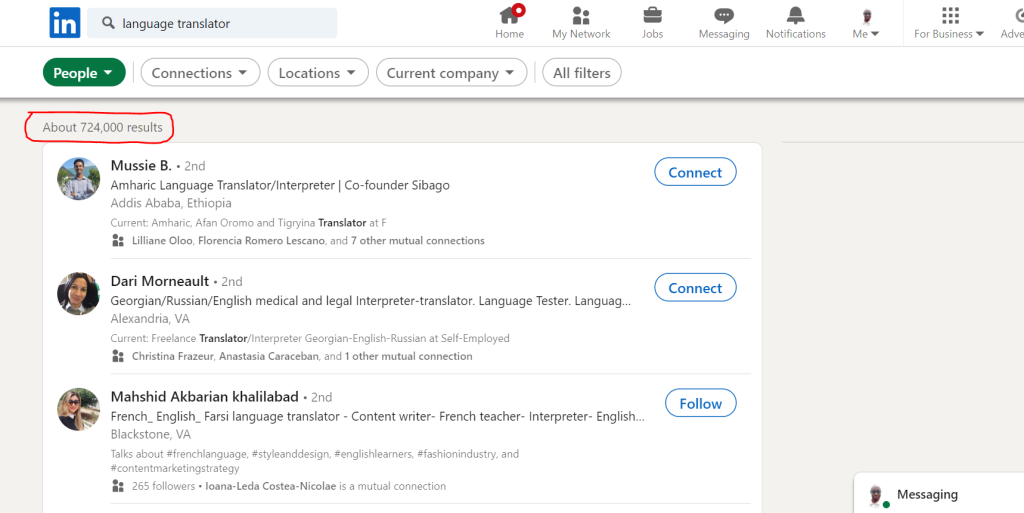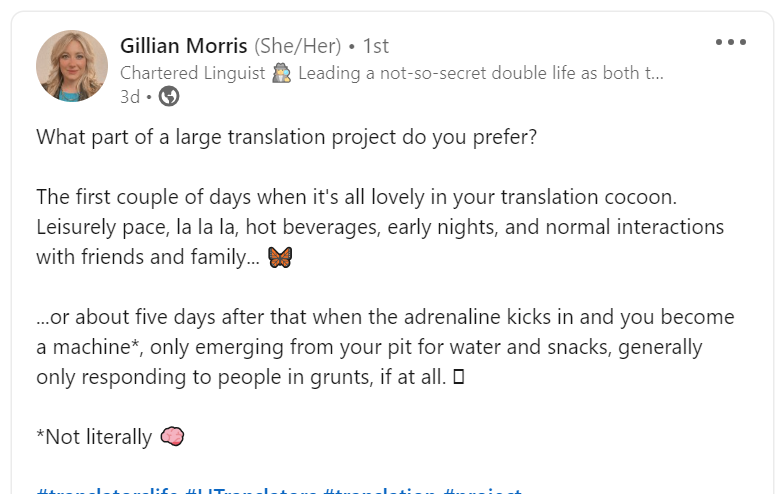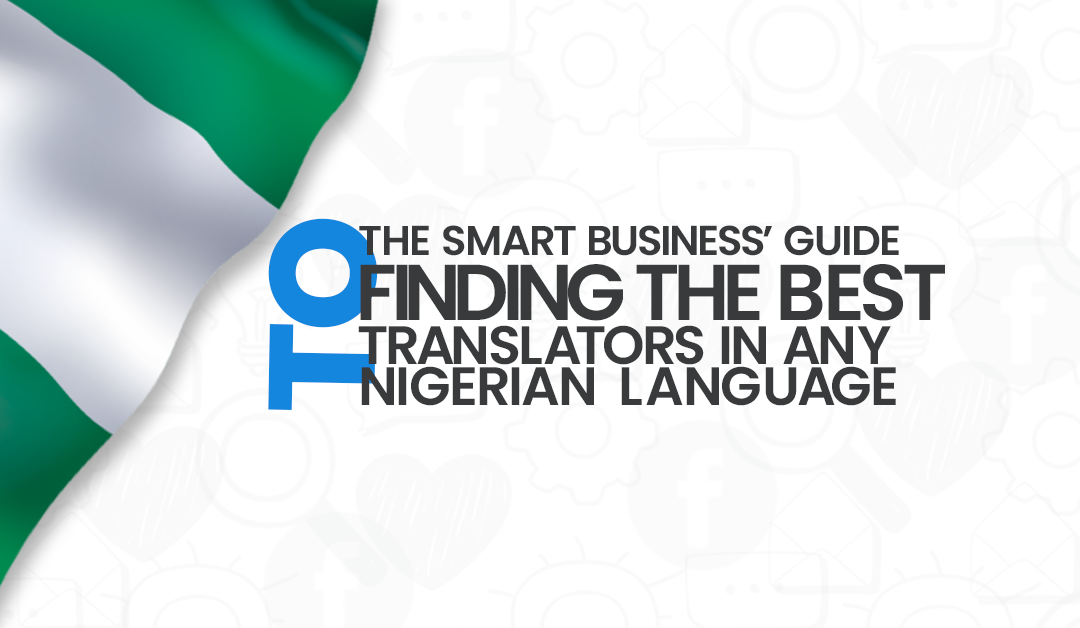If you’re reading this article, chances are you’re looking to hire a Nigerian translator in Igbo, Hausa, Yoruba, Nigerian Pidgin or any other Nigerian language that is skilled and highly knowledgeable in both the source and target Nigerian language for your translation project, but entertain fears of falling into the wrong hands.
Your fears are valid.
In 2019, there were about 556,000 registered Linkedin users in the translation and localization industry. By 2020, the number has increased to 722,000 .
A quick search on Linkedin at the time of writing this article indicates that there are about 724,000 translators on the platform. An increase of close to 50% from the 2019 data.
Everyday, there’s an influx of people into the translation industry. Among them are thousands of Nigerian translators who except for being knowledgeable in a foreign language, and native speakers of their mother tongue, have no prior training nor experience in translation.
This makes it difficult to be able to identify translators of Nigerian languages who are able to deliver on translation projects without falling short on quality and timely delivery.
The best way to resolve this problem, is to make a list of criteria for identifying translators best fit for your translation project and applying this to your search.
The criteria could be:
- Expertise in translating from the source to target language,
- Knowledge in the theme of the project content and,
- Translation experience in the target language.
But limitation in the knowledge of how to implement this criteria in distinguishing expert translators from mediocres, make business owners fall into the wrong hands. And they pay dearly for it, both in cash and time. I’ve been privy to a handful of their experiences.
To be able to successfully identify the best translators in your target Nigerian language, you first need to know the qualities that separate them from mediocre translators, places you can find them and how to identify them.
Let’s dive in.

Contents
Categories of Nigerian Translators
As a translator with experience translating, proofreading and editing more than 900,000 words of Igbo and Nigerian pidgin English. And working with Nigerian translators on projects in other Nigerian languages, I have identified three categories of translators across the various Nigerian languages:
- The novice/newbie translator,
- The amateur translator and,
- The meticulous/expert translator.
The Novice Translator
The novice Nigerian language translator is a native speaker of his mother tongue and is confident in his ability to handle projects in the language, simply because he can speak and (to a degree) write the language.
He does well on projects with minimal amount of words. On projects with large amounts of words, he does well in some sentences, but because of inexperience and desperation to meet deadlines, he commits lots of contextual, spelling and word-flow blunders that’d require a meticulous translator in the language to notice.
The novice translator is either out of a steady job or has one, and uses translation as a side job. Therefore, he dedicates more time to his main job, while allocating a little time to translation.
He’s more bothered about delivery deadlines than the quality of delivery, and is most likely to rely heavily on Google Translate to execute translation jobs.
Again, the monetary reward that comes with the job is his main drive.
One key factor to note about the novice translator is that they’re inexperienced and are usually desperate to land jobs. This make them agree to very low rates.
Some even ask to be paid at the discretion of the hiring manager. E shock you abi? (Nigerian pidgin for, “You’re shocked, right?”)
If you’re more keen on hiring Nigerian translators for low rates, then be prepared to fall into the hands of a novice translator.
The Amateur Translator
He’s a native speaker of his mother tongue, knowledgeable both in speaking and writing the language, and equally has one or two translation caps to his belt.
When the amateur translator lands a gig with his native language as the target language, he does well translating the easier words. But when words starts to get tougher, sentences longer and project submission deadline nearer, just like the novice translator, he strolls to Google translate, pick words that he knows are incorrect, scribbles them down and moves on with an air of, “I no fit kill myself” (Nigerian pidgin for, “I can’t kill myself over this”).
To the amateur translator, translation is a side hustle, as he has a 9 to 5 or everyday business he considers more important.
Because of his inability to balance working on his 9 to 5 job and translation jobs, the amateur translator has a penchant for delaying communication in the midst of projects.
He’s a specialist at offering unending lines of excuse for delayed delivery, and may totally ghost on you in the midst of projects with large volume of words.
A major differentiating factor between the amateur translator and his novice counterpart is in the proofreading and editing of their deliveries. While it is easier to proofread and edit the work of a amateur translator, work done by the novice translator may require a total overhaul of already done work.
The Meticulous Translator
The third type of translator is the meticulous translator. This translator is a native speaker and writer of his mother tongue, he has been a translator for years and has featured in many translation projects.
When he’s working on a task and the words start to grow tough, he devotes some time in-between work to research on the words, so as to give a good representation of the words in his native language.
He braves the mental fatigue usually associated with projects with large volume of words, and delivers on the job, with little or no room for further editing.
The meticulous translator is a professional and is more interested in delivering quality jobs, beating delivery deadlines and keeping his clients happy.
His rates are higher than those of the other two translators, but his delivery is top notch and often arrive on time too or a little late sometimes.
Where to Find the Best Nigerian Translators
All translation platforms, social media spaces and freelance marketplaces, including the ones listed in this article, have the three listed categories of Nigerian translators registered on them.
But if you need to find the best translators in any Nigerian language, the best places to go looking are:
- Translation companies
- Proz
Translation Companies
If you have a limited knowledge on how to hire the best translators for your translation projects and not willing to apply the trial-and-error approach which is usually stressful and time consuming, the best place to find the best translators in any Nigerian language, is in translation companies that offer translation services in Nigerian languages.
This is because:
- Translation companies have worked on translation projects in Nigerian languages and have accumulated a storehouse of tested, proven and trusted translators, capable of taking on translation projects in different subject matters.
- They have mastered the art of separating newbie and amateur translators from the professionals, making it easy for them as a company to deliver quality jobs.
- They have in-house quality checks to ensure that work delivered is well done and error free.
Noteworthy Facts About Translation Companies
When shopping translation companies for your translation projects into a Nigerian language, there are facts you need to know so as to be able to pick the right one.
Fact 1. Translation companies come in 2 types
There are two types of translation companies. – The generalist and specialty translation companies.
These two can each be further divided by: the translation services they render, the languages they translate into and the business niches they serve.
Generalist translation companies offer various translation and language services, translate into all languages, and serve all types of businesses.
An example of a generalist translation company is Vistatec.
Specialty translation companies on the other hand, offer a select number of translation services, in a select number of languages, and have select types of businesses they serve.
A typical example of a specialty translation company is The Web Content Company, which offers blog writing and translation services to software, tech and IT brands in English and all Nigerian languages.
Another example is Alconost, a software localization and marketing video creation company. Focused on localization of software and creating marketing videos in all languages for companies in the information technology niche.
Fact 2. Brevity Signals High Expertise
There’s nothing wrong with translation companies:
- Offering the generality of translation services,
- Offering translation in all languages and,
- Serving all industries.
However, translation companies who specialize in select languages, fewer translation services and serve select niches tend to offer a higher chance at quality and fast delivery on translation projects.
This is because their focus and experience in the select niches, predispose them to having in-dept understanding of the vocabulary and the context of words and phrases in their niche.
For instance, a translation company in the cryptocurrency niche has a higher chance at quality and fast delivery on crypto themed translation projects, because their translators already understand the meaning of crypto terms and the context of crypto phrases.
They can easily translate the terms into their native languages without having to spend several hours researching on the meaning and context of crypto words.
Fact 3. The Closer the Company, the easier the Find
Nigeria has over 250 ethnic nationalities and languages. Igbo, Hausa and Yoruba are the 3 most dominant of them all.
There are thousands of professional English to Igbo, Yoruba and Hausa translators. They can be easily found on all online and offline platforms. But it is extremely hard to find professional translators in rare Nigerian languages like Boki, Jukun, Itsekiri, Atyap, and many others.
To find professional translators in these languages, you’d need translation companies based in Nigeria.
This is because, whether it’s online or offline, Nigerian-based translation companies that offer language services in Nigerian languages, know the right places to find translators in those languages.
Linkedin is a social media platform and a repository of professionals in all fields of work, including translation and language services.
It is the second best platform for finding professional translators in most of the world’s languages in your niche of choice.
You can find translators of Nigerian languages on the platform by searching with just their native language, or with both their native language and translation niche.
For example, you can either search for “Nigerian Pidgin translator” or “Nigerian pidgin + software translator”
How to Spot the Best Nigerian Translators on Linkedin
On Linkedin, there are 2 ways to identify translation experts in local Nigerian languages.
The first is in the content they share on the platform.
Professional translators are known for sharing their experiences and expert opinions on the platform. Novice translators share none.
The second is in the work experience displayed on their Linkedin profiles.
While expert translators display the companies they have worked for in the past, the ones they are working for in the present, and the projects they have worked on, novice translators either have insignificant or no experiences to share.
A note of warning though.
It is more safer to consider both the type of content Nigerian translators in your target Nigerian language share on the platform and the work experience displayed on their Linkedin profiles, and not just rely on the work experience shared on their profiles when searching for translators on Linkedin, so as to avoid being swayed by a translator’s perceived expertise, which might be nonexistent.
Because it is common practice in language translation circles for some companies to hire translators, get them to sign non-disclosure agreements, but never send them jobs.
These translators may go ahead to add those companies on their Linkedin profiles, giving an impression that they’ve worked in the companies, but in reality they have no jobs to show for it.
“It is common practice in language translation circles for some translation companies to hire translators, get them to sign NDAs, but never send them jobs.”
3. Proz
Proz is an online marketplace dedicated to translation services, where translation companies and other companies needing translation services get to meet with translators of various languages and niches.
Expert translators in Nigerian languages on Proz can be identified by the referrals from their clients, their years of experience, the samples of work they share on their profile and by using the “Certified Pro Network” feature on the platform.
The problem with Proz though is that, translators of all categories are registered on the platform.
For expert translators to rank tops on the platform for their language and translation niche, they first have to become paying members on the platform.
This means that, a novice translator in a select language can purchase Proz’s annual membership before the experts in same language, and get to rank on the first page of Proz search result for keywords related to the language, ahead of the experts.
Many translators including the best Nigerian translators aren’t paying members on the platform. So, their profiles are tucked away into the far ends of Proz search results, where their chances of being discovered is longer than river Nile.
For example, an IT Igbo translator first needs to become a subscriber to Proz’s $120 annual membership in order to stand a chance at appearing on the first page of Proz search results for keywords like “Igbo IT translator” .
This further adds complexity to the task of distinguishing between professional translators and novices on the platform.
What to Consider when Hiring Translators for Translation Projects in Nigerian languages
Here are qualities to look out for when looking to hire translators for your project into any Nigerian language.
Native speaker-ship in target language
When looking to hire translators for a translation project into a Nigerian language, it is always better to hire translators who’re native speakers of the target language.
Native speaking translators tend to have deeper knowledge and understanding of the use of their language than translators who’re not native speakers in same language.
Translation experience in target language
The best translators are translators who have previous translation experience working on projects in their native language and have worked on projects with multiple thousands of words.
Translation experience mentally prepares a translator for upcoming translation jobs, both in terms of applying the use of words in the target language and in the use of translation software.
Again, some translation jobs come with thousands of words and tight deadlines. These type of jobs are more mentally tasking. They require translation research experience and mental strength to successfully conclude in set time.
Novice and mentally lazy translators usually start to offer flimsy excuses in the middle of such work and may eventually ghost on you.
But professional translators with a haul of translation experience and loads of work to show for it, see such jobs as an opportunity to grow a positive reputation for their brand and increase their income.
They approach translation with a career mindset and are dedicated to delivering quality and meticulous work even under tight deadlines, so as to please their clients.

Niche expertise in project theme
It is absolutely okay to hire translators who’re really experienced at translating in your target Nigerian language.
But it is much better to hire experienced translators of your target Nigerian language, who are experts in the field your project content fall within.
When a project theme matches a translator’s niche of expertise, it is easier for the translator to understand:
- The vocabulary of the niche,
- The meaning of niche words and,
- The context of phrases involved in the translation.
For example, it is easier and faster for an Igbo translator with experience localizing cryptocurrency content for brands to replicate same for another crypto brand, than an Igbo translator without such experience.
Entrusting your translation project to a niche translator will ensure timely delivery, because the translator will spend less time researching the words involved. They’re not new to him.
It would ensure that delivery is top notch, because your project’s theme corresponds with the translator’s knowledge scope.
Conclusion
With the large number of translators working in Nigerian languages, picking out the best translators for your target Nigerian language can be tough.
There’s always the temptation to give up on your search for the best and settle for the next available translator whose profile pops up on your screen.
But if top notch delivery and zero disappointments is what you truly desire, then going the long stretch to find the best Nigerian translator for your project, will be worth the stress.

